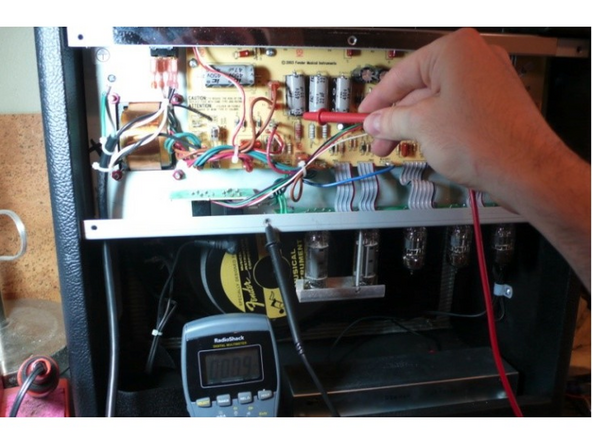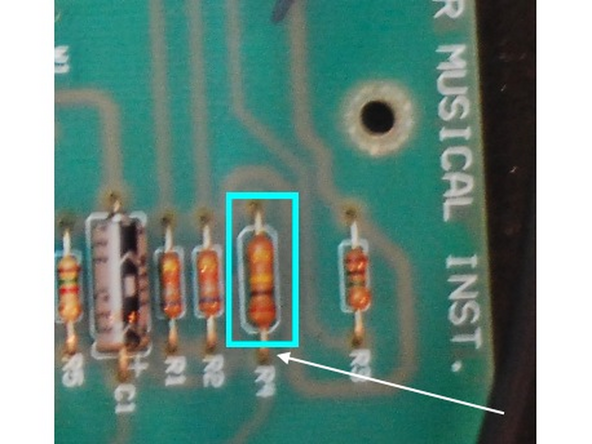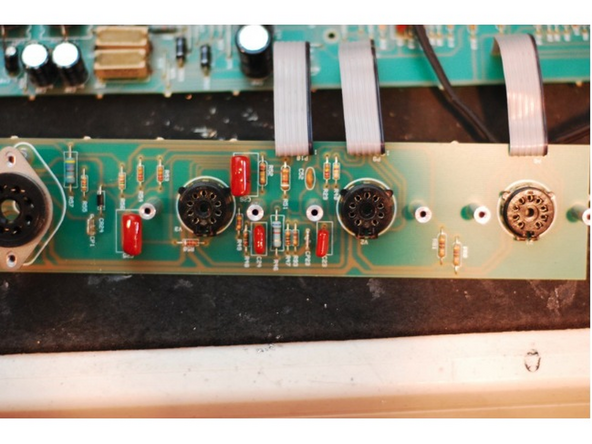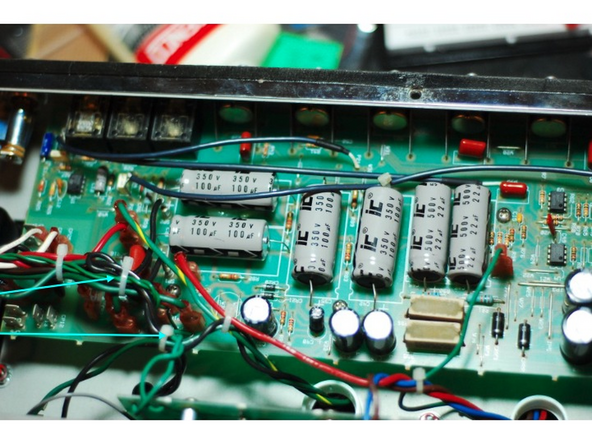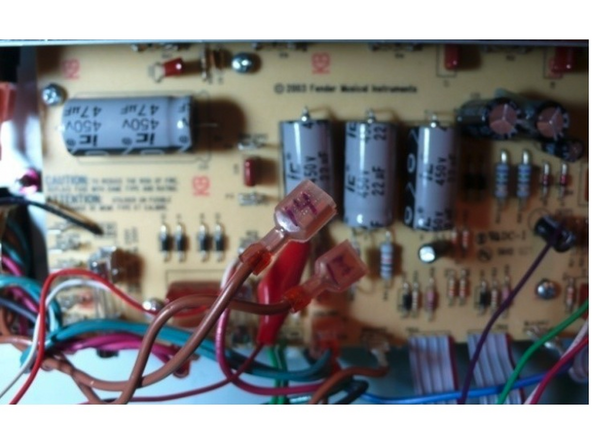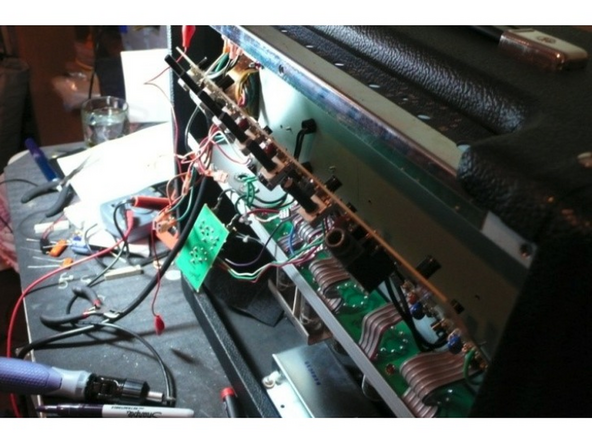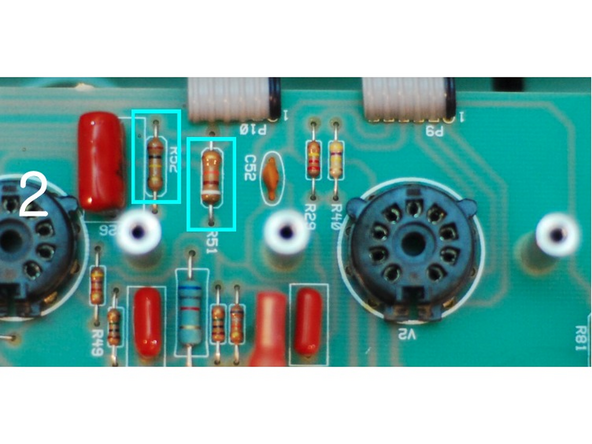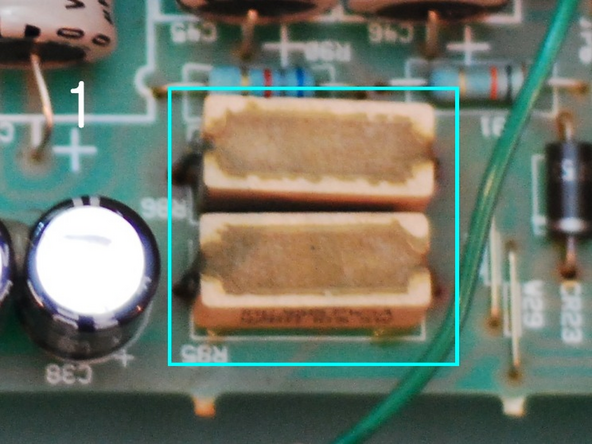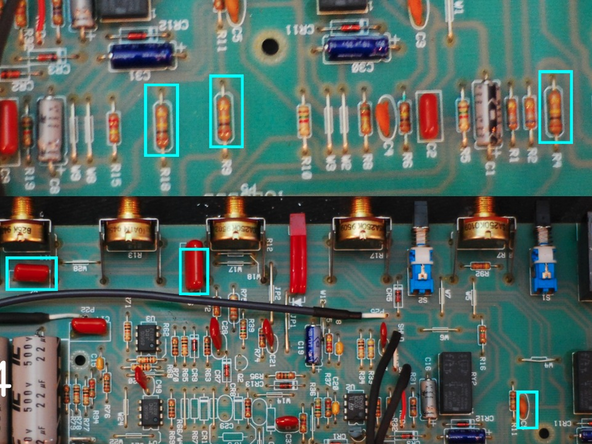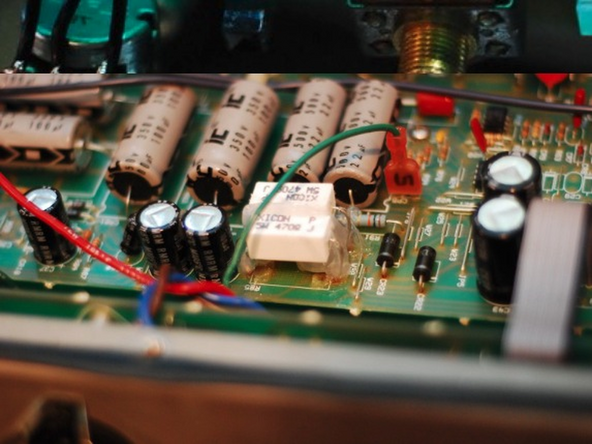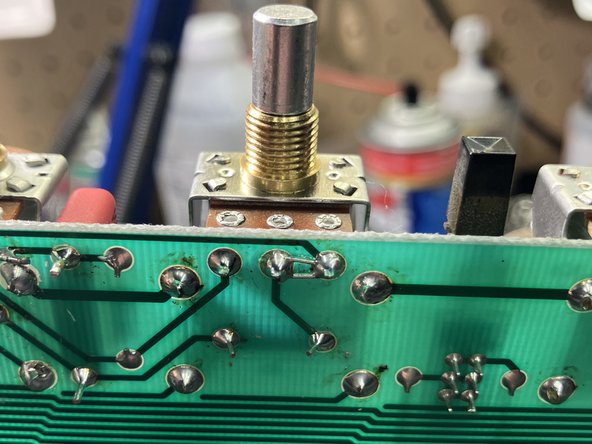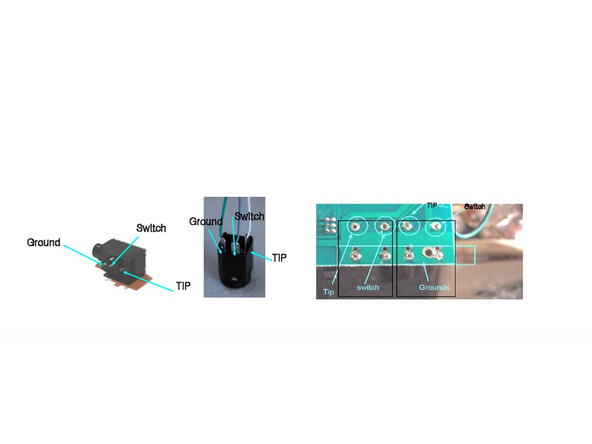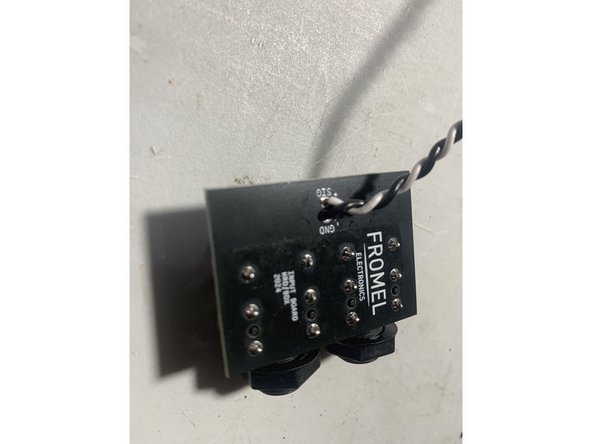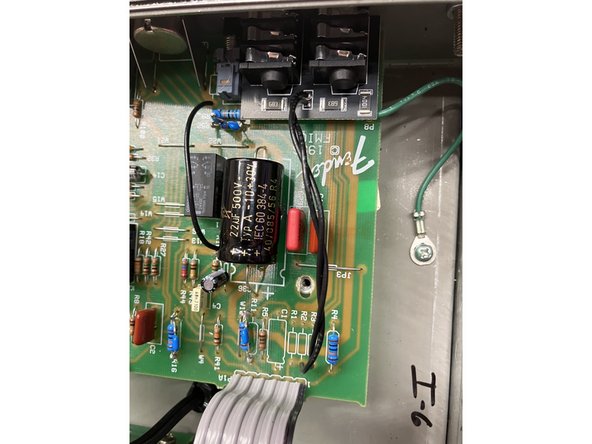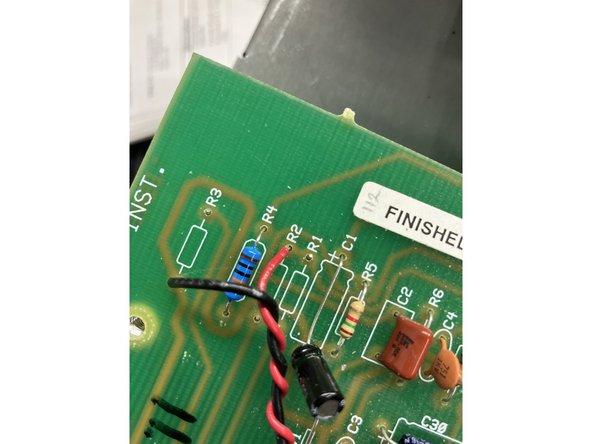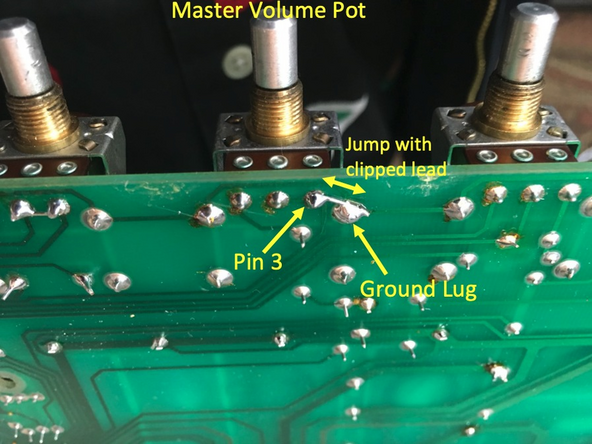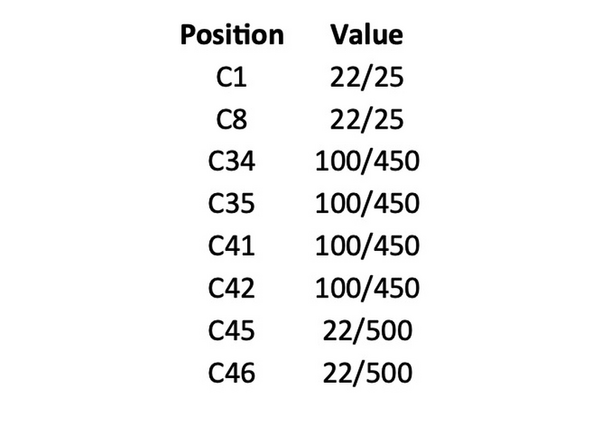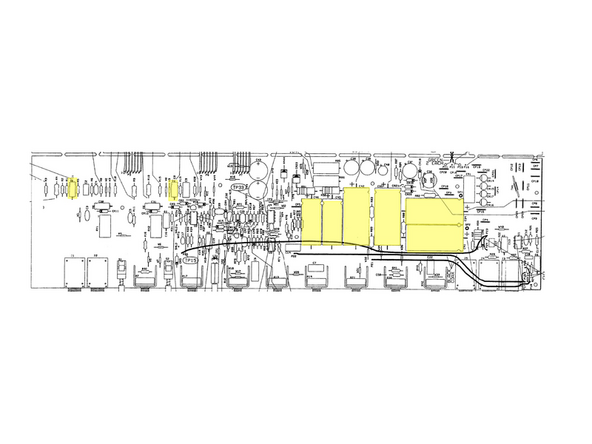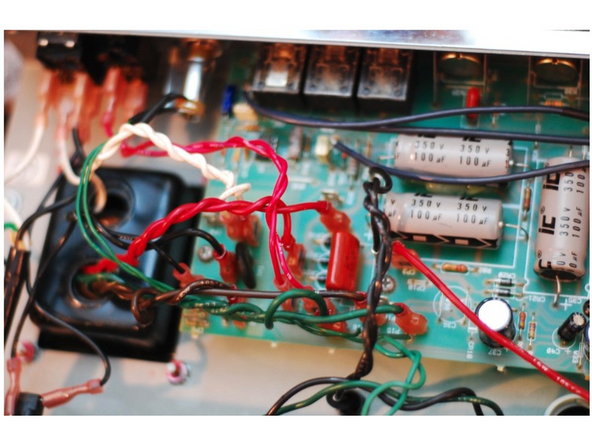Tools
No tools specified.
Parts
- Wima .015 10mm Cap
- Wima .1 15mm Cap
- 270pf 500v Cap
- 91k 1/2 Watt Resistor
- 100k 1/2 Watt Resistor × 4
- 330R 5W resistor - Blues Deville USA only
- 470R 5W resistor - Blues Deluxe only
- Fromel input jack PCB
- Closed jacks & nuts × 2
- 120mm lead × 2
- Supreme kit only - 22uf cap low voltage × 2
- Supreme kit only - 22uf/ 500V cap × 2
- Supreme kit only - 100uf/ 350V to 500V cap × 4
-
-
You can buy the kit from us here: https://fromelelectronics.com/collection.
-
WARNING Performing these modifications WILL void the warranty on your amp. Working on amps can be DEADLY if you do not take proper precautions.
-
Follow these instructions very carefully. I HIGHLY recommend reading through all the instructions thoroughly before you start. If at any point in the mod process you are at all unsure of your ability to do these mods take your amp to a professional to be modded. You can also send your amp chassis( and tubes!) to me to be modded.
-
No Warranty - This kit and the instructions do not include a warranty of any kind. The modifications to your amplifier are at your own risk and you agree to hold harmless the seller of this kit against any and all claims
-
Tube amps contain parts that operate at very high temperatures and deadly voltages.
-
There a couple of differences between the Deluxe and Deville and depending on which amp you're working on there will be different instructions you'll need to follow
-
-
-
Unplug the amp and place on a level surface
-
Remove the chicken head control knobs by loosening the set screws. Remove the nuts and washers holding the potentiometers and jacks on the top panel
-
Remove the screws holding on the back panel and remove the panel. If the back panel does not come off easily you can loosen the chassis screws on the side of the amp about a half turn each
-
-
-
With the amp off and unplugged check to see if your caps are charged, set your multi-meter to DC and measure the voltage at the positive side of the filter cap closest to the power switch
-
If you measure more than 12VDC, you need to drain the caps. If there are less than 12VDC you may proceed to the next step
-
FAILURE TO DO THIS STEP COULD CAUSE INJURY OR DEATH BY ELECTROCUTION!
-
Connect an alligator clip jumper from the bottom( tube) side- see pic- and the other clip to the chassis.
-
Wait a few minutes and then measure again. Repeat until all of the large power supply caps are under 12VDC
-
-
-
Remove the smaller tube PCB that supports the tube sockets: Remove the tubes and then remove the small black screws that hold both the larger tube PCB and the smaller V1 tube PCB to the chassis. Gently lift both tube PCBs free of the chassis
-
-
-
Remove all zip ties. They can be clipped off, be sure to not clip any wires or strip any insulation from the wires.
-
Unplug all of the quick connect leads from the choke, power, and output transformers and the switches by pulling on the quick connect firmly with steady pressure while gently rocking it from side to side. Using a pair of angled needle nosed pliers makes this much easier
-
As you remove each lead be sure to mark the terminal number on the lead with a fine point Sharpie pen so you will know where to plug it back in when the amp mods are done
-
Remove all PCB standoff screws and the solder terminal screw connecting the green ground wire from the Main Pcb near the input jacks to the chassis.
-
Remove knobs and all nuts and washers from the control panel
-
-
-
Pull gently on the PCB to make sure that it's not stuck to any of the standoffs where screws had been holding it
-
Press the wires from the output transformer and reverb as far away from the PCB and as close to the chassis as possible. The edge of the PCB will need to come down to the bottom of the amp where the tube PCB was before the pots will be able to clear the chassis
-
Using gentle pressure on the top of the board and making sure it's not getting hung up on any wires push it towards the back of the chassis( where the tube board was) until the pots have cleared the top of the chassis then pull the board up to you to expose the solder side of the board
-
DO NOT PUT ANY PRESSURE ON ANY COMPONENTS INCLUDING THE FILTER CAPS WHEN TRYING TO MOVE THE BOARD
-
-
-
1: Remove the Power Resistors R85 and R86
-
2: Remove R51 and R52 on the Tube PCB
-
3: Remove R4, R9, and R18
-
4: Remove Treble Cap C5. Bass Cap C6. Mid Cap C7
-
Remove C50 just under the reverb pot. I recommend clipping both leads from the component side of the PCB
-
-
-
Install: 270pf cap in C5, .1uf in C6, and .015uf in C7
-
At the Mid Tone Pot, bridge pins 2 and 3 which are the holes closest to the Power and Standby Switch. Use part of a lead clipped from one of the components already installed. I like to bridge the pins on the solder side of the board
-
After these mods your amp will not make sound with all of the tone controls all the way down. This is on purpose! What you're doing is changing the tone stack to a vintage style which gives you a greater range on the mid pot.
-
DEVILLE ONLY: Install the 330 ohm power resistors at R85, and R86. Install them so they sit off the PCB by about 1/4 inch. Make Sure the leads are bent about 1/16 of an inch off the resistor
-
DELUXE ONLY: Install the 470 ohm power resistors at R85, and R86. Install them so they sit off the PCB by about 1/4 inch. Make Sure the leads are bent about 1/16 of an inch off the resistor
-
At R51 install the 91K Resistor. Install 100K resistors at R52, R4, R9, and R18
-
The small blue MLCC caps can be identified by the 3 number cap code printed on them in very very small lettering, I have to use shop glasses, a magnifying glass, AND a bright light to see the numbers. The first two numbers are the cap value and the third is the decimal point. The 270pf is marked 271 for example.
-
-
-
Remove the Input Jacks. This part is snapped into the PCB then soldered, I find it easiest to remove the solder from the back side first then remove the jack. You can also clip the leads on the solder side of the PCB after the solder is removed to aid in removing the input jack
-
Install the new input jacks—The leads are already dressed. Please refer to the pic for the correct placement of the wires. There are two versions of the USA Blues series, in each case there are three wires to connect. The Ground, switch, and Tip.
-
If your old jacks look like the one on the left wire according to where the old pins were. If your PCB looks like the one on the right then wire for that configuration
-
-
-
Remove R3, R2, and R1.
-
Twist the120mm leads
-
Solder one end of the twisted pair to the jack PCB at SIG and GND as shown in the photo and the other ends into R2 and R3: the lead from the jack PCB SIG goes to the tube side of R2 and GND goes to the ground side of R3
-
The ground side of R3 may be different than the photo. The easiest way to tell which is the ground side is to use your multimeter set to continuity and test both sides of R3, whichever side has continuity with the ground side of C46( the side opposite the '+' marking on the pcb) is the ground side
-
-
-
If you want to use your Master Volume control to work with both the Volume control as well as the Drive control, simply perform the following mod
-
Jump the 3rd pin of the Master Volume pot to the ground lug right of pin 3 with a clipped lead - see pic
-
-
-
Following the chart and layouts in the pics replace all the caps with the values in the pic. Make sure you mind the polarity of the caps, they must be inserted the right way or your amp will have problems which could be serious.
-
The circuit board will have a “+” sign closest to the hole where the positive lead of the cap goes. The axial caps have an indented ring on the positive side and a “-” sign in an arrow pointing to the neg- ative side. For radial caps the longer lead is the positive side and there is a “-” sign in a band closest to the negative terminal
-
-
-
Carefully put the Main PCB back into place making sure the pots, switches, and LED all line up with and fit snugly to the control panel.
-
Replace all the PCB mounting screws
-
Re-install the Tube PCBs
-
Dress the wires between the Main PCB and Tube PCB, make sure they have plenty of distance from each other and aren't resting on any parts.
-
Mount the new input jacks in the chassis.
-
Re-install the washers and nuts for the pots and other jacks.Do not over tighten the jacks for the effects loop or footswitch jacks
-
Dress the transformer leads. Instead of replacing the cable ties we removed we're going to use standard wiring techniques for proper amp lead dress. Twist all AC pairs together: twist green wires together, red, and brown
-
Re-install the control knobs
-
-
-
Mount the chassis back in the cabinet if you took it out
-
STOP! DOUBLE CHECK ALL YOUR WORK
-
Replace the back panel and tighten the chassis screws if you loosened them
-
Enjoy your new amp!
-

